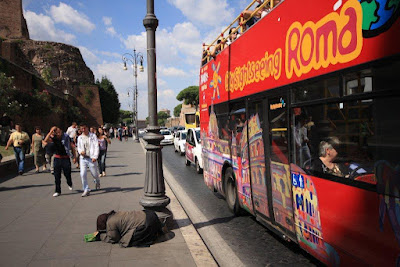Smyrna (Greek:
Σμύρνη or Σμύρνα) was an ancient city located at a central and strategic point on the Aegean coast of Anatolia. Thanks to its advantageous port conditions, its ease of defence and its good inland connections, Smyrna rose to prominence. The ancient city is located at two sites within modern Izmir, Turkey. While the first site rose to prominence during the Archaic Period as
one of the principal ancient Greek settlements in western Anatolia, the second, whose foundation is associated with Alexander the Great, reached metropolitan proportions especially during the period of the Roman Empire, from which time most of the present-day remains date.
The Great Fire of Smyrna is the name commonly given to the fire that ravaged Smyrna starting
13 September 1922 and lasting until 17 September 1922. It occurred four days after the Turkish army regained control of the city on 9 September 1922. Turks systematically burned the city and killed Greek and Armenian inhabitants. There is extensive relevant eyewitness evidence from Western troops sent to Smyrna during the evacuation, foreign diplomats/relief workers based at Smyrna and Turkish sources. The fire mainly affected the Greek quarters of the city, taking many lives.
Ethnic cleansing soon followed, resulting in the expulsion of most of the Greeks from the city, ending their 3000 years presence in Smyrna.
George Horton was the U.S. Consul General of Smyrna who was compelled to evacuate Smyrna on September 13, arriving in Athens on September 14. He published his own account, in 1926, of what happened in Smyrna and included testimony from a number of eye-witnesses and additionally quoted a number of contemporary scholars. Horton noted that it was not till after the Armenian quarter had been cleared by Turkish soldiers that the Turkish soldiers torched a number of houses simultaneously, on September 13, behind the American Inter-Collegiate Institute. Moreover, they waited for the wind to blow in the right direction, away from the homes of the Muslim population, before starting the fire. This is backed up by the eye-witness report of Miss Minnie Mills, the dean of the Inter-Collegiate Institute:
"I could plainly see the Turks carrying the tins of petroleum into the houses, from which, in each instance, fire burst forth immediately afterward. There was not an Armenian in sight, the only persons visible being Turkish soldiers of the regular army in smart uniforms." This was also confirmed by the eye-witness report of Mrs King Birge the wife of an American missionary, who viewed events from the tower of the American College at Paradise.
Here is an abridged summary of notable events in the destruction of Smyrna described in Horton's account:
* Turkish soldiers cordoned off the Armenian quarter during the massacre. Armed Turks massacred Armenians and looted the Armenian quarter.
* After their
systemic massacre Turkish soldiers, in smart uniforms, set fire to Armenian buildings using tins of petroleum, and other flammables, with flaming rags soaked in those flammable liquids.
* To supplement the devastation, small bombs were planted by the soldiers, under paving slabs around the christian parts of the city to take down walls. One of the bombs was planted near the American Consulate and another at the American Girl's School.
*
The fire was started on September 13. The last Greek soldiers had evacuated Smyrna on September 8. The Turkish Army was in full control of Smyrna from September 9. All Christians remaining in the city who evaded massacre stayed within their homes fearing for their lives. The burning of the homes forced Christians in to the streets. This was personally witnessed by Horton.
* The fire was initiated at one edge of the Armenian quarter when a strong wind was blowing toward the christian part of town and away from the Muslim part of town. Citizens of the Muslim quarter were not involved in the catastrophe. However, the Muslim quarter did celebrate the arrival of the Turkish Army.
* Turkish soldiers guided the fire through the modern Greek and European section of Smyrna by pouring flammable liquids in to the streets for the fire to consume. These were poured in front of the American Consulate to guide the fire there and this was witnessed by C. Clafun David, the Chairman of the Disaster Relief Committee of the Red Cross (Constantinople Chapter) and others who were standing at the door of the Consulate. Mr Davis testified that he put his hands in the mud where the flammable liquid was poured and indicated that it smelled like mixed petroleum and gasoline. The soldiers that were observed doing this had started from the quay and proceeded towards the fire thus ensuring the rapid and controlled spread of the fire.
* Dr Alexander Maclachlan, the president of the American College, together with a sergeant of the American Marines were stripped and then beaten by Turkish soldiers with clubs. In addition, a squad of American Marines was fired on.
Aristotle Onassis who was born in Smyrna, and who later became the richest man in the world, was one of the Greek survivors of Smyrna. The various biographies of his life document notable and quite sensitive aspects of his experiences during the Smyrna Catastrophe. His life experiences were recreated in the movie called Onassis, The Richest Man in the World and includes Onassis' personal relationship with a Turkish officer.
During the Smyrna Catastrophe the Onassis family lost their substantial property holdings which were either taken or given to Turks as bribes to secure their safety and freedom. They became refugees fleeing to Greece after the fire. However, Aristotle Onassis stayed behind to save his father who had been placed in a Turkish concentration camp. He was successful in saving his father's life. During this period Onassis lost three uncles and one aunt with her husband Chrysostomos Konialidis and their daughter, who were burned to death when Turkish soldiers set fire to a church in Thyatira where 500 Christians had found shelter to avoid Turkish soldiers and the
Great Fire of Smyrna.

















































